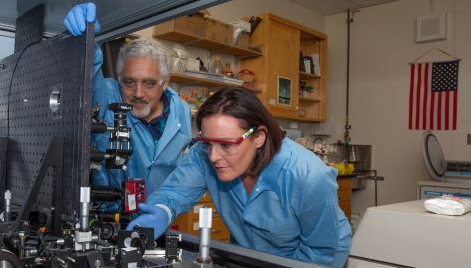NIH establishes Cooperative Research Center with Lawrence Livermore National Laboratory and two University of California campuses, Irvine and Davis
Source:

National Institutes of Health establishes a new Cooperative Research Center through a three-way partnership involving the Lawrence Livermore National Laboratory and the Universities of California, Irvine and Davis.
Julie Russell/LLNL
Irvine, Calif. – Oct. 24, 2019 – A Cooperative Research Center (CRC) has been established by the National Institutes of Health at three institutions including the Lawrence Livermore National Laboratory (LLNL), the University of California, Irvine (UCI) and the University of California, Davis, with a single goal to enhance and accelerate the development of vaccines for Chlamydia trachomatis genital infections.
The new center will be funded under a five-year, $10.1 million grant from the National Institute of Allergy and Infectious Diseases (NIAID).
Already underway, the CRC, officially known as the “Cooperative Research Center for NanoScaffold-Based Chlamydia trachomatis Vaccines,” began operations on Oct. 1, 2019. It is led by co-directors, Matt Coleman, an LLNL biomedical scientist, and Professor Luis M. de la Maza, a pathologist at UCI’s School of Medicine and a worldwide leading expert in chlamydia vaccinology.
“By establishing a CRC for the formulation of a chlamydia vaccine, the NIH has created a wonderful opportunity for a collaborative effort involving three very prestigious institutions,” said de la Maza. “Leveraging the expertise of these three partners significantly increases our chances of successfully developing a vaccine that can be given to young individuals preventing them from contracting chlamydia and protecting them from the negative consequences of an infection.”
de la Maza’s lab has been working on a chlamydia vaccine for almost four decades. As a part of the CRC, their work will focus primarily on using the chlamydia outer membrane protein (MOMP) as the vaccine antigen. Other researchers, including UCI’s Ellena M. Peterson and Sukumar Pal, have also made significant contributions to this project.
Coleman, at LLNL, has developed methods to correctly fold membrane proteins in vitro. His team of scientists will build on a nanotechnology – called nanolipoprotein particles (NLPs) – for delivering the C. trachomatis vaccines.
At UC Davis, R. Holland Cheng’s lab will be using cryo-electron microscopy to characterize the structure of the native C. trachomatis MOMP. This structural characterization will help to inform the formulation of the MOMP in NLPs, effectively tying together the efforts of the three collaborative institutions.
C. trachomatis is the most common bacterial sexually transmitted infection in the country. Attempts to control this pathogen, with screening programs and antibiotic therapy, have so far failed. The number of cases of C. trachomatis infections reported to the Centers for Disease Control and Prevention (CDC) continuous to increase. In 2017, more than 1.7 million cases were reported. The long-term sequelae of a C. trachomatis infections in females include pelvic inflammatory disease, chronic abdominal pain, ectopic pregnancy and infertility. Babies born from infected mothers can develop conjunctivitis and pneumonia.
